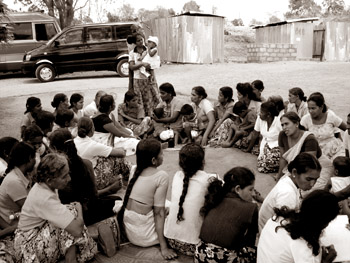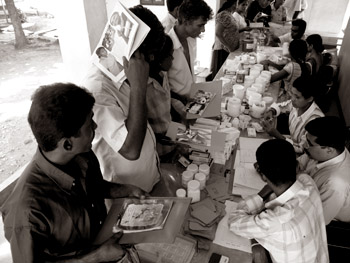Integrating people with mental illness into the development process
by Ranga Chandrarathne
|

National Workshop
|
The National work shop on 'Integrating People with Mental illness
into the Development process' not only shed light on the issues
concerning integrating people with mental illness into the development
process ranging from social exclusion to poverty but also provides
insight into the socio-economic benefits that the society can derive
from such a move.
In a presentation based on a case study of sustainable livelihoods
module developed in Angunukolapelessa, Dr. Margaret Kuruppu establishes
links between poverty and mental illness.
Owing to the poverty which leads to economic deprivation, mental and
behaviourial disorders started to surface. People with mental illness
are generally excluded from the family and considered as 'one more mouth
to feed'. However, sustainable livelihood module focused on highlighting
the fact, which mentally ill people could actively participate in the
development process.
The programme encouraged inclusion of people with mental illness at
family and community level. Some of the income generation projects which
have been implemented are home gardening and pot/plant vegetable as
'occupational therapies'. The case study showed a remarkable degree of
acceptance of people with mental illness into the community and the
gradual reduction of stigma.
|

Beneficieries participating in the community projects organised by
the “Basic Needs” |
Enterprises such as running groceries, banana cultivation, brick
making, plants nurseries and floriculture which have been commenced with
micro credit schemes, recorded a 95% recovery rate. The livelihood
programme demonstrated that people of "Angunukolapelessa" are productive
and that the model can be applied to other impoverished areas in
reduction and sustainable development programmes.
However, the capacity building issues involves imparting technology,
improving marketing, accounting and business skills, and packaging and
progress in these areas would entail more integration of people with
mental illness into the development process, enabling them to make a
substantial contribution to the economy.
Community Physician Dr. Shiromi Maduwage, in her presentation on
'Family relationship and Psychological wellbeing of people with mental
illness', explores the close nexus between family and people with mental
illness in Sri Lankan context.
Since in most of the developing countries, people with mental illness
live with their families; 80-95% of psychiatric patients in Sri Lanka
live with their families, the psychiatric patients? well being by and
large, depends on the kind of relationship they maintain with their
families.
Looking after a patient, invariably, can be rewarding or burdensome
to their families. So it is important that the relationship between
family and the psychiatric patients should be strengthened in order to
create an atmosphere conducive to people with mental illness at family
and community levels.
She identified factors such as self-reliance (the ability to remain
independent, related to self-esteem and a positive self-image which
contribute largely to emotional wellbeing) on the part of patients,
personal growth, purpose and harmonious relationship, which contribute
immensely to the overall wellbeing of the people with mental illness who
are living with their families.
The series of programmes aimed at promoting long term family
relationship in a community and improving psychological well-being of
the mentally ill in the community, have been carried out in seven
Divisional Secretariat Levels (Angunukolapelessa, Dikwella, Katuwana,
Suriyawewa, Suruwirugama, Embilipitiya and Panamura).
The activities include awareness programmes on mental illnesses and
treatments, family education programmes on home based rehabilitation and
periodical follow-up of the patients by team of Mental health
professionals and the programmes resulted in increasing understanding
among family members, improving mutual support between ill persons and
other family members and the improvement in management of domestic life
and environment in homes.
She pointed out that sharing understanding of family problems of
other mentally ill people, building of coping skills and reduces
discrimination within the family would contribute to creation of
conducive atmosphere at home for people with mental illness.
The presentation by Dr. Jayan Mendis on the 'Horticultural Therapy
projects' deals extensively on the state of the Mental Hospital at
Angoda prior to the project and the positive change brought about by the
project to the hospital. The condition at the hospital was appalling
with hospital staff terrorizing the patients. He further mentioned the
care provided in the hospital was worse than the care provided in a
prison.
It has also been found out that the hospital staff was not trained
and at most instances consist of persons sent by politicians. The staff
used patients' beds, toilets, TV's and most of the facilities available
to them. A notable case was an assault on a Bhikku. Generally, assaults
on the patients by hospital staff were not reported as well as patients'
injuries.
Dr. Mendis further observed that the families of the patients had
never had enough facilities to talk to the patients. The Horticultural
Therapy Project which was commenced at the abandoned office of the
Director Mental Health not only generated income to the patients, in
addition to rehabilitating them, but also helped to improve the
environment of the hospital.
As the nurses union blocked this development and the nurses were not
released for the work, a group of supporting staff was trained and
products yields from the project is sold at the stall 'Shakthi' set up
at the hospital premises. While part of the income generated by the shop
goes to the continuance and the development of the project, a fraction
is deposited in participants' accounts.
The presentation on 'Community-led Interventions in Integrating
Mental Health into Development' by Consultant Psychiatrist Dr. Neil
Fernando deals with the defects in the traditional system for delivery
of mental health care and the need for new initiative which would
address the present issues.
Dr. Fernando points out that the existing system of delivery of
mental health care is more or less, a centralized and hospital-based,
disease-oriented structure with mental health care delivered by medical
personnel. The news system Dr. Fernando proposes is a one that is
de-centralized, community based and patient oriented with community
participation.
He further stressed that community-led interventions could be made
through consultative workshops, mental health camps, self-help groups,
spiritual cultural interventions, mental health promotion and
children-led interventions.
Developing a village mental health plan and forming a village mental
health committee are some of the measures taken in the consultation
process and regular mental health camps conducted at village level had
increased the public awareness on the issues and provided psychiatrist
drugs.
The self-help groups have contributed to reducing stigma and
networking and family cohesion among the community in addition to their
intervention in crisis situations. Dr. Fernando asserts that the
self-help groups have trained persons with mental illness in income
generation projects.
The pilot project conducted involving 724 persons with mental illness
and 5847 others in the high risk group yielded impressive findings that
72% of persons with mental illness engaged in income generation projects
independently compared to 28% prior to the projects.
[email protected] |
